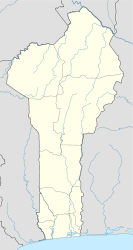Djougou
| Djougou | |
|---|---|
| Commune and city | |
 |
|
| Location in Benin | |
| Coordinates: 9°42′N 1°40′E / 9.700°N 1.667°E | |
| Country |
|
| Department | Donga Department |
| Area | |
| • Total | 3,966 km2 (1,531 sq mi) |
| Elevation | 431 m (1,414 ft) |
| Population (2009) | |
| • Total | 237,040 |
| Time zone | WAT (UTC+1) |
Djougou is the largest city in northwestern Benin. It is an important market town. The commune covers an area of 3,966 square kilometres and as of 2002 had a population of 181,895 people.
The city of Djougou is the capital city of the department of the Donga, and is considered to be the commercial capital of the Atacora-Donga region, with Natitingou acting as the seat of government and the primary tourist city. Djougou has a population of over 200,000. While Dendi is the primary language and ethnic group in Djougou, there are also a number of Fulani, Pull, Yoruba, Bariba, as well as transplanted Fon from the South. Like most of Benin, Djougou has a young and growing population. Large families and multiple wives are common—leading to a large number of young and school-aged children and pregnant women. There are many different neighborhoods throughout the city, but they are fairly amorphous. People are quicker to identify where they live not by the name of their neighborhood, but by which main road it lies on or by a nearby landmark or mosque.
The population of Djougou is predominantly Muslim, with each neighborhood boasting at least one mosque. Muslims in Djougou range from the very conservative to the fairly liberal. It is relatively common to see women completely veiled in black, including their faces. More often, however, Muslim women wear a headscarf and a few wear no veil of any kind. This wardrobe decision is made by following family tradition until marriage, after which she follows the traditions of her husband’s family. Conservative Muslim men refrain from alcohol, but most are not opposed to drinking. Nearly all Muslims abstain from eating pork and observe the calls to prayer. There is a considerable Catholic presence in Djougou as well with a large cathedral, a convent, seminary, and Catholic school system that runs through secondary school. Religion is important to the people of Djougou and it is common to be asked your religious affiliation when meeting someone new. This is done out of curiosity, not prejudice, and there appears to be a considerable amount of religious tolerance here. Christian and Muslim holidays are both celebrated.
Djougou is a major hub of transportation and communication. It acts as a crossroads of trade and travel, and is easily accessible during the entire year. There are four major roads that intersect to form the city’s center—the roads to Cotonou, Parakou, Natitingou, and the Ouake/Togolese border. As a relatively wealthy city, there are members of the community who own private cars, including the other families in my concession. Many families in the community have at least one moto that they use as their primary means of transportation. In addition, Zemidjians are easy to find throughout the city. Cell phone communication is very consistent in Djougou, and all major carriers have service in the area pretty much all of the time. Internet communication is also available in the cyber cafes and in some office buildings, although the connection is not always reliable.
...
Wikipedia

